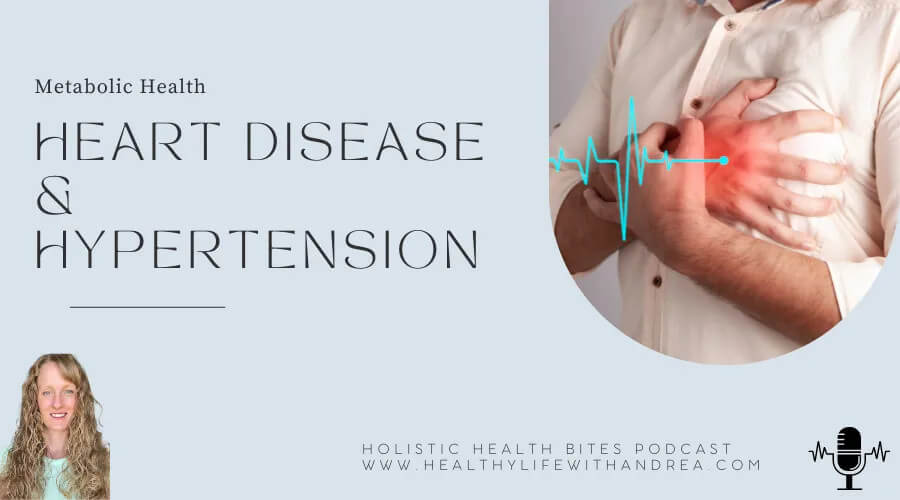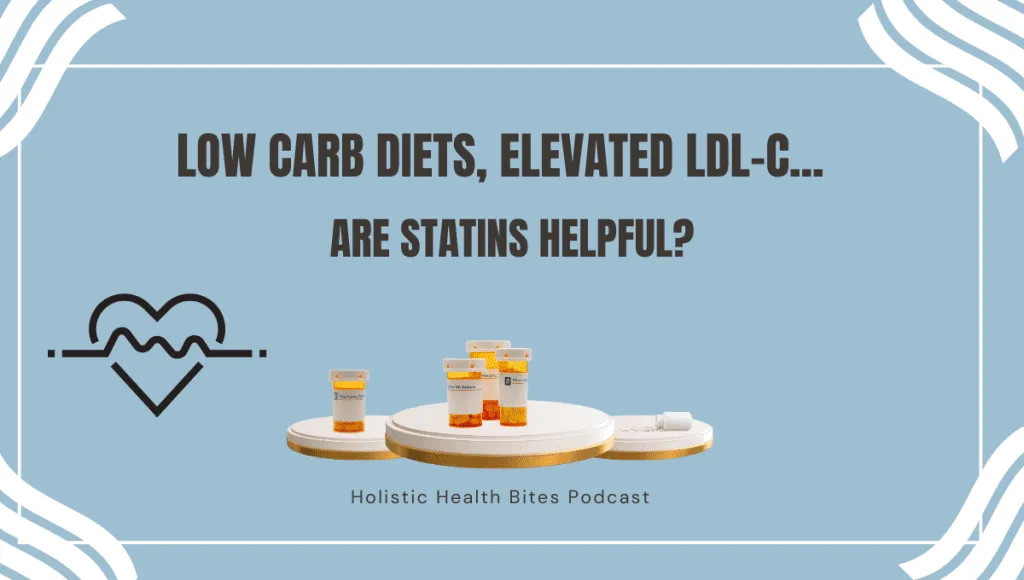
In this episode, we’ll be discussing the causes of heart disease and hypertension – specifically how this relates to metabolic health. Yes – heart disease and high blood pressure are both metabolic disorders.
Heart disease and hypertension
Heart disease is still the leading cause of death in both men and women in the US with just under 700,000 deaths every year and affects over 81 million people. And nearly half of all adults in the US have high blood pressure, with slightly higher rates in men than women. Elevated blood pressure is considered anything over 120/80. This can include either a systolic over 120 and/or a diastolic over 80. Having elevated blood pressure also increases your risk of developing heart disease or having a stroke. The term heart disease is really not very descriptive, as it encompasses a variety of health conditions like hypertension, thickening of the heart muscle, blood vessel plaque, or nearly any other condition of the heart or the cardiovascular system.
What mainstream health and conventional medicine won’t likely tell you is that insulin resistance is at the root cause of heart diseases. Nearly everyone with high blood pressure also has insulin resistance – and new research is showing that insulin resistance and high insulin levels cause the development of heart diseases. The great news about this is most cases of heart disease and hypertension can be improved through diet and lifestyle (not necessarily medications or surgeries). Sadly, standard practices still use medications as a first line.
What does the research say about hypertension medications?
- Randomized clinical control trials have shown that medications either do not improve or only slightly improve the outcomes of otherwise healthy people with stage 2 hypertension (>140 systolic and/or >90 diastolic).
- Reviews of 38,000 patient charts found no reduction in risk of heart disease events or risk of death in those with mild hypertension and the use of medications.
Causes of hypertension and heart disease
Hypertension and heart disease can be caused by a variety of factors, and some do require some specialized treatment – such as in those with kidney or endocrine disorders, sleep apnea, vascular abnormalities, and the use of some medications. Most common cases are directly related to other factors like obesity, a sedentary lifestyle, excessive alcohol consumption, smoking, stress, family history, and genetics. What is little discussed is insulin resistance – but insulin resistance is directly tied to nearly all cardiovascular diseases. In fact, abdominal obesity comes with increased fat around the organs like the liver which directly relates to insulin resistance. This weight also causes changes in hormones that alter kidneys, adrenal glands, and other tissues that affect blood pressure.
How do insulin resistance and high insulin levels lead to hypertension and cardiovascular diseases?
- Causes excess secretion of a hormone called aldosterone from the adrenal glands which contributes to salt and water retention. This added fluid volume increases blood pressure.
- Causes a thickening of the blood vessel walls, causing a narrowing of the inside of the vessel for blood to flow. This tighter space increases the pressure inside the vessel, leading to higher blood pressure.
- Activates the sympathetic nervous system (stress response) causing the blood vessels to constrict. In truly stressful conditions, like running from a predator, this constriction is helpful and can increase blood flow for nutrients and oxygen delivery. We don’t want to live in this stressed-out state all the time though!
- Decreases nitric oxide release which prevents blood vessel dilation. If the vessels can’t dilate, the blood will be under greater pressure.
- And causes unhealthy changes to your blood cholesterol (like smaller, more dense molecules that can more easily infiltrate your blood vessel lining causing atherosclerosis) and too many lipids (triglycerides) in your blood.
- Increases inflammation markers like C-reactive protein. Insulin acts as an anti-inflammatory in insulin-sensitive people, but increases inflammation in insulin-resistant people! Combine this increased inflammation with increased blood pressure and you’ve dramatically increased the risk of blood vessel damage
Ok, so do you now see how significant insulin resistance and metabolic health are on cardiovascular health?
What can you do about your risks?
- Test! Find out where your risks are right now. Blood pressure, fasting glucose, fasting insulin, hemoglobin A1c, cholesterol panel, CBC with differential and comprehensive metabolic panel at a minimum. Most conventional doctors should be able to run this – the only exception you may have to fight for is fasting insulin but this one is critical!
- Focus on the diet! Insulin resistance is directly related to blood sugars and the type of dietary fat you consume. Blood sugars are directly related to carbohydrate intake. Eliminate as many processed foods as possible. This includes baked goods, most bars, premade drinks and meals, refined sugars, and low-quality vegetable oils (canola, corn, cottonseed, soybean, safflower, sunflower, grape seeds, and rice bran). Eat whole, quality meats, eggs, seafood, above-ground vegetables, and limited whole fruits. Limit grains of any kind and starchy root vegetables grown underground.
- Move! Exercise at least a few days a week and walk every single day. Specifically, walk after meals, and do resistance training at least 3 times per week (body weight or with added resistance/weight).
- Work with a professional to achieve your goals. This might be your more holistically or functionally minded doctor, a chiropractor, an acupuncturist, a well-trained personal trainer, or a holistic nutrition professional like me.
If you know anyone who could benefit from this information, please feel free to share it.
Next week, we’ll be back talking about metabolic health and thyroid disorders. Until then, be well and vibrant!




















0 Comments